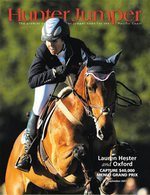by Tonya Johnston
Appeared in Hunter Jumper Magazine, September 2007
If we treat the medal final as an ‘exam’ of sorts, we will need to ‘study’ the physical side (lessons, cross-training, etc.) and the mental side of the sport (focus, a positive attitude, etc.). Thankfully, your trainer is with you every step of the way to perfect your physical and technical skills; but do you have a clear plan for your mental preparation?
Do you know the punch line to the old joke: “How do you get to Carnegie Hall?” (“Practice!”) The same answer rings true to the question: “How can I be sure to ride well at medal finals?” As we all know, riding is both a physical and mental sport that requires a lot of practice. Therefore, a medal final can be looked at as a final exam for all of the practice you have put in throughout the year – how much knowledge and skill can you demonstrate over two or three rounds, plus work-offs?
If we treat the medal final as an ‘exam’ of sorts, we will need to ‘study’ the physical side (lessons, cross-training, etc.) and the mental side of the sport (focus, a positive attitude, etc.). Thankfully, your trainer is with you every step of the way to perfect your physical and technical skills; but do you have a clear plan for your mental preparation?
Preparation: Before You Get There
Set Performance Goals
Very often, when people think or daydream about riding in medal finals they tend to get stuck focusing on the outcome of the class. (I want to win, make the work-off, top ten, etc.). Outcome goals can be very useful – they motivate us, they help us get that ‘killer instinct’, they help us believe winning is possible – but they must be balanced with performance goals to be truly effective. A performance goal is a goal you set based on measuring your performance against your own progress whereas outcome goals, based on competitive results, can be distracting and anxiety-producing because they not entirely within your control.
Performance goals help you focus in the ring when they are supported by specific strategies for success. For example: Alison has a performance goal of maintaining a forward pace throughout her course. Her strategies are: 1) start counting going into every corner and 2) keep her hands up and in front of her body. The strategies you use are created with information learned from your trainer; they help bring your goals into the ring with you and lock your focus on things within your control.
Visualize Yourself at the Final
Imagine if you could school at the venue where the finals will be held, over difficult courses, before anyone else even arrived. You can give yourself this opportunity by visualizing yourself at the final before you get there. If it is a show you have never been to, try to find pictures and/or video from prior years to watch before you visualize. Use past courses if you have them, or make up courses and draw them out on paper to be specific about the ring and surrounding environment. Creating a detailed scene will help you create an effective visualization. Some people will even get butterflies in their stomach as they imagine themselves waiting at the back gate; you can use your imagery to practice feeling confident and calm as you start, ride a smooth and flowing round, and finish your course feeling happy and successful.
Preparation: At the Medal Final
You may be the most effective and stylish rider in the class, but if doubt and fear of failure cloud your thinking you may not ride up to your potential on the day. Is there a tough, bending four or five stride option to a one-stride? A skinny end jump set on an awkward angle? Stay confident, keep your focus on the solution to the challenge, and plan the ways you will create a successful ride. Your confidence level is the key to unlocking your talent, particularly when you walk through the in-gate.
Ways to Tune-Up Your Confidence
- Keep your pre-ride routine consistent as much as possible within the unique schedule of the finals. Focus on what you can control. Look for opportunities to keep yourself in a comfortable routine – all the way from what you eat for breakfast to how you warm-up.
- Plan specific times and places to rest throughout each day.
- Integrate your performance goals into your course plan. Look at the course as an opportunity to demonstrate your strengths, talents and progress as a rider.
- Remind yourself of the skills and qualities you possess to get the job done well. Recapture feelings of strength and accomplishment by remembering excellent rides from the past.
- Don’t sweat the small stuff. Stay proactive with your thoughts – when something happens that is unexpected, think: “How will I solve this challenge?”
Confidence and success comes from mental and physical preparation. As this classic quote from legendary coach Bear Bryant highlights, “It’s not the will to win, but the will to prepare to win that makes the difference.”
Tonya Johnston, MA, is a sport psychology consultant and hunter/jumper competitor. She has worked with equestrian athletes for the past 15 years. Tonya’s clients have attained competitive success at every level, including national titles and awards. Her website can be found at: www.TonyaJohnston.com.


